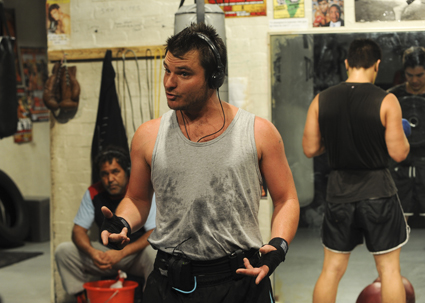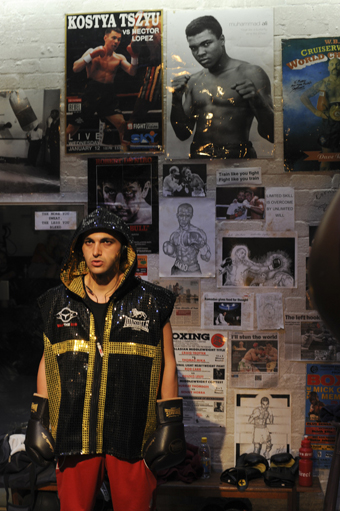The not so sweet science
Mike Bodnar: Roslyn Oades, I'm Your Man

Billy MacPherson, Justin Rosniak, John Shrimpton, I’m Your Man
photo Heidrun Löhr
Billy MacPherson, Justin Rosniak, John Shrimpton, I’m Your Man
When Gus Mercurio, one of the seven boxing personalities represented in I’m Your Man, starts talking about neural synapses and how one fighter’s “brain started givin’ way” I immediately thought of Muhammad Ali. It is hard not to wince whenever I watch that once graceful and eloquent boxer, now living with Parkinson’s disease, struggle to move and talk in TV appearances.
A man renowned as much for his skill in the ring as for his poetic pronouncements and personality in front of the cameras, Ali’s physical decline over time is such a sad testament to the long term effects of the sweet science. This physical decline, as well as the youthful effervescence characteristic of the quest for success, has been on display in Roslyn Oades’ I’m Your Man at the Darwin Festival.
The American born Mercurio is played by Australian actor Justin Rozniak. As an aged and well-spoken Australian icon of the sport, Mercurio, who sits on a stool at the edge of the stage, is a welcome counterpoint to the bubbling and sometimes bumbling dialogue of the younger fighters. The play opens, as any fight would, with the sound of a bell. But in the lead up, as the audience enters the theatre, the actors are already on stage, training. We are looking at a ‘real’ boxing club: punching bags, an exercise bike, gaudy posters of previous fights. And the actors are throwing real punches. Billy McPherson as the grizzled old trainer is frightening in his intensity, holding the focus mitts and barking out punch combinations.
All of the actors in I’m Your Man wear headphones, speaking along to edited interviews with boxers, thus reproducing all the stutters, the pauses and the verbal tics of the original dialogue. The central figure in the production is Sydney based fighter Billy ‘the Kid’ Dib. Oades followed Dib over an 18-month period as he pursued the IBF World Title belt. We hear Dib, convincingly played by Michael Mohammed Ahmed, describing quite candidly what it is like to be a fighter. He traces his career, explaining how he defeated several opponents and how he would deal with defeat should it ever come. We also hear from Wale ‘Lucky Boy’ Omotoso, a Nigerian-Australian fighter who watched his sparring partner die in the ring, and CJ a pugnacious London based fighter with a serious problem with authority. There is also an appearance by the legendary Tony Mundine, sharing his views on the fight game along with his opinions on women, sex and smoking. The dreams, the turbid histories and, most of all, the braggadocio of current and former boxers are laid bare for us on stage.
I’m Your Man is Roslyn Oades’ third effort in a verbatim-theatre trilogy that explores “acts of courage” (program notes). In the bouncy, fast paced dialogue of Billy Dib we have our best opportunity to appreciate some of the sort of courage one might need in order to step into the ring and swing at another person. But even more interesting is the fact that this play, with its particular approach to representing dialogue, is about a sport with a difficult relationship to communication. Just like Jeff Fenech, who tells us that he was probably one of those guys who stopped the nation, so much of a boxer’s persona, and perhaps even his success, depends on what he says about himself. It is, of course, never humble. That unbridled ambition and self-confidence is such an inextricable part of the sport. But there is also an ugly truth about boxing that is exposed in the delivery of the dialogue. The repeated blows to the head result almost unavoidably in brain damage and this often manifests itself in a former fighter’s speech. I’m Your Man, with its use of verbatim dialogue, presents an opportunity not just to see represented the courage and the ambition of boxers young and old, but also to think about their long-term impacts.

Mohammed Ahmad, I’m Your Man
photo Heidrun Löhr
Mohammed Ahmad, I’m Your Man
The scenes involving Jeff Fenech made me consider some of those consequences. There is a strain in his voice, some stutters and pauses seeming a little too long in Justin Rozniak’s account of the character. They might well be simply the verbal tics, the “unique qualities of speech patterns” (program notes), that Oades sought to capture in her interviews, but they could also be evidence of serious and irreparable brain injuries that boxing has wrought. When considering the fact that Fenech, like others in the play, are former boxers talking about their success it is not easy to ignore the thought that the verbal stumbling might be a result of that success. Interspersing the testimonies of older boxers with younger ones makes this thought more poignant.
Explaining her use of verbatim theatre for this production, Oades writes of her long held fascination with the “unique qualities of speech patterns, individual vocabularies and group conversations” (program notes). Over the course of the 70-minute production we are treated to a series of such speech patterns that culminate in a wonderfully realistic depiction of a pre-match build up with Bill ‘The Kid’ Dib. We follow Billy and his team into a dimly lit dressing room before his test against Jorge Macierva. While Dibs bounces around the dressing room floor his trainers and corner men repeat over and over variations on “How Billy is going to destroy the Mexican.” The group exchange is as smooth as Billy’s nimble movements and provides a fascinating insight into the unconscious work of coordination in which humans partake when conversing in a group. All the body language and facial expressions that enable one to find the right moment to talk and argue are accurately replicated by the assembled cast.
As these men—likely fighters themselves with their own injuries to endure—usher another ambitious fighter to the brink, feeding him dreams of triumph along the way, it is hard not to wonder if it is all worth it. I’m Your Man is certainly worth it. It’s an intensely arresting meditation on a colourful but potentially damaging path to glory.






